Artificial intelligence is not just a buzzword – it’s here to stay. This extraordinary technology is already assisting us with tasks ranging from fun and mundane to pivotal. It has many uses in business, marketing, and even education.
One of the most prominent AI models in this regard is ChatGPT created by OpenAI. Countless students have already made great use of it in their academic life.
Although AI use in academia is controversial, it can become an irreplaceable tool for students and take their educational experience to the next level. If this sounds interesting to you, keep reading! This article by our custom-writing experts will cover the pros and cons of ChatGPT in your studies. You will also learn the best ways to maximize Chat GPT’s benefits and minimize the drawbacks.
🤖 How ChatGPT Works
ChatGPT (the letters stand for Generative Pre-Trained Transformer) is an artificial intelligence-based chatbot that simulates human speech through natural language processing. It can answer your questions as well as write longer texts such as emails, articles, and essays.
ChatGPT is based on continuous machine learning, which enables it to adjust and gain more knowledge from every conversation. Essentially, this language model predicts the next word in a text based on the previous words and their context using probability distribution methods.
The central aspect that makes ChatGPT more powerful than other current AI models is its enormous database. It enables the chatbot to write meaningful texts, comprehend millions of topics, and understand prompts as accurately as possible.
But ChatGPT is not just a powerful tool – it’s also very convenient, which makes it a perfect homework assistant for students:
- It’s easy to register and log into your account.
- The free version of GPT-3.5 is capable of handling virtually any task, from creating PowerPoint presentations to assisting you with research.
- The paid version is available for $20 and offers even more capabilities, such as a more advanced version of GPT-4, Internet access, and helpful plugins.
But that’s not all of it – keep reading to learn all about the benefits of AI for your studies!
🔥 Benefits of Chat GPT for Students
It comes as no surprise that students are actively using AI in their academic life. In fact, a recent survey discovered that out of 43% of college students who tried ChatGPT, 89% used it for their homework and 53% for essays.
But what makes ChatGPT such a good study helper? Well, check out its amazing benefits below and see for yourself!
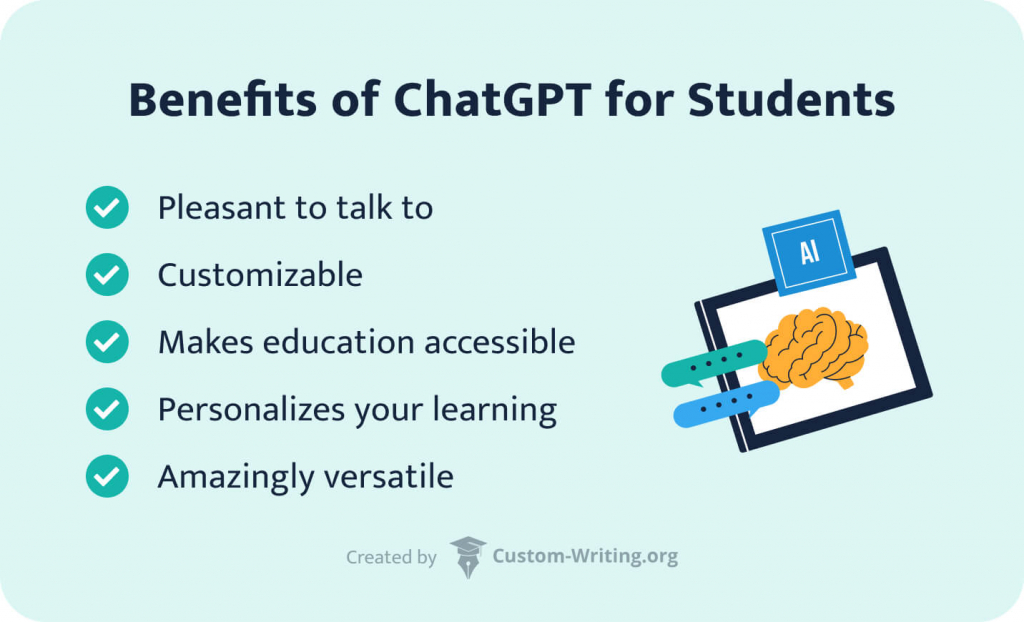
Benefit #1: It’s Pleasant to Talk To
Unlike search engines, traditional study tools, and simpler AI models, ChatGPT has a very nice communication style. It comes off almost like a real person. It can be serious, funny, entertaining, or whatever you want it to be. Even if you struggle with concentration, you’ll enjoy discussing things with ChatGPT for hours.
But the best part is that it sounds like it cares for you, ending ordinary replies with reassuring statements such as “if you have any specific concerns, feel free to let me know!” or “good luck with your exams!” It’s hard to believe, but according to thousands of Reddit users, after chatting with this bot for some time, you may even start thanking it for its replies and addressing it like a living being.
Benefit #2: It’s Customizable
Here’s another benefit: you can customize how ChatGPT responds to you. For instance, if you prefer receiving answers in a particular format or specific wording, you can tweak the settings so that the chatbot will reply the way you want it to.
Here’s how to do it.
First, click on your username and go to Custom Instructions. There, you’ll need to answer the following questions:
✏️ What would you like ChatGPT to know about you to provide better responses?
In this field, you can state your academic level, course name, and the subject you are studying. We suggest you additionally specify things that AI will take into account to make its answers more accessible to you.
Example:
I’m a Computer Science major finishing my Bachelor’s degree. I have ADHD and dyslexia. I enjoy studying Biotechnology and Physics.
✏️ How would you like ChatGPT to respond?
In this field, you can specify your preferred response format.
Example:
Provide responses using short sentences and use lists for longer responses. Avoid complicated academic language and unnecessary wording.
💡 Pro tip:
We recommend making your requirements detailed and clear. Asking the chatbot to “never write lists” won’t do much – it will keep writing lists. “Avoid writing your replies in list format. Write it in plain text instead and use transition words” will work much better.
Benefit #3: It’s Very User-Friendly
ChatGPT is easy to navigate, even if you’re not a tech geek. Its simple user interface with nothing but the dialog box and chat history make it very user-friendly and intuitive.
You only need to remember that your prompts must be well-written and contain all the necessary information. If you go into too much detail, the chatbot will provide a vague response, and if your prompt consists of one or two words, it will probably refuse to answer unless you provide at least some specifics.
Suppose you want inspiration for an essay on AI’s effect on job losses. If you prompt the tool to “talk about unemployment,” you will get a long and generic definition that won’t be helpful at all.
And here is an example of a good prompt that will help you produce a very specific answer:
The prompt above is much better than the first one since it contains more information about the topic and the essay structure. The resulting answer starts with an effective introduction, has a strong thesis statement, and logically discusses the Industrial Revolution in the body paragraphs.
💡 Pro tip:
If you want to generate an essay sample but don’t want to waste time formulating a good prompt, you’re welcome to use our free Chat GPT essay maker. Additionally, you can create examples of separate essay parts with the help of an introduction writer and a hook sentence generator.
Benefit #4: It Makes Education More Accessible
Since ChatGPT is free to use and easy to master, education also becomes more accessible with it. Don’t believe us? Then check out how ChatGPT can help students facing various educational barriers:
- ESL students can use AI to translate educational texts or to generate answers in another language.
- Students with high levels of anxiety can ask ChatGPT any questions without fear of being judged.
- The premium version of ChatGPT also has a text-to-speech function that can be very helpful for visually impaired students. This function is likely to become available with the free version in the near future.
- Students with learning disabilities can use the chatbot to simplify and shorten complex texts.
All this makes ChatGPT an excellent tool helping more people to study comfortably.
💡 Pro tip:
You can use text-to-speech technology right now with the help of our “read my paper” tool.
Benefit #5: It Personalizes Your Learning Experience
With its customization options and the capacity to learn from past conversations, ChatGPT can offer an individualized approach to your studies. If you specify your educational needs and preferences in your prompts, the chatbot will provide you with answers that work best for you, just like with a real tutor.
For example, you can use the following prompt to request feedback on your written work:
Have you ever thought that you have never been free in your whole life? The thought is terrifying for most of us. Freedom is integral to humans and should be a fundamental goal of society, as it allows individuals to exercise autonomy, pursue their dreams and aspirations, and contribute to developing a just world.
Although freedom of speech, religion, thought, and conscience are fundamental rights, we still need certain laws and regulations to build a successful society. Absolute freedom would allow people to do whatever they want with each other unpunished. Therefore, one can be free only as long as their freedom doesn’t limit the freedom of others.
Freedom is a vital component of human nature, and its pursuit is an essential goal of society. The ability to act according to our own will, express our thoughts and beliefs, and make our own choices allows us to lead fulfilling lives and contribute to the world. While the quest for freedom is an ongoing struggle, it is worth fighting for. Freedom creates a just and equitable society where individuals can pursue their aspirations with dignity and respect.
The chatbot gave this essay B+ and gave ten valuable suggestions regarding every aspect of writing.
Benefit #6: It’s Amazingly Versatile
Among the many advantages of ChatGPT, this is the biggest one. The chatbot is a universal tool to handle all kinds of study-related tasks. If you haven’t tried some of them yet, then definitely do it the next time you need to complete any of the following:
- Summarizing and paraphrasing
- Rewriting technical terms
- Providing examples
- Offering step-by-step guidelines
- Taking notes
- Planning your studies
- Checking your texts
- Helping prepare for exams
- Providing inspiration and ideas
Summarizing and Paraphrasing with ChatGPT
One of ChatGPT’s most valuable aspects is that it can effectively paraphrase passages and summarize essential concepts from lengthy texts. This will come in handy whenever you need to quote someone else’s scholarly work in your research paper or thesis.
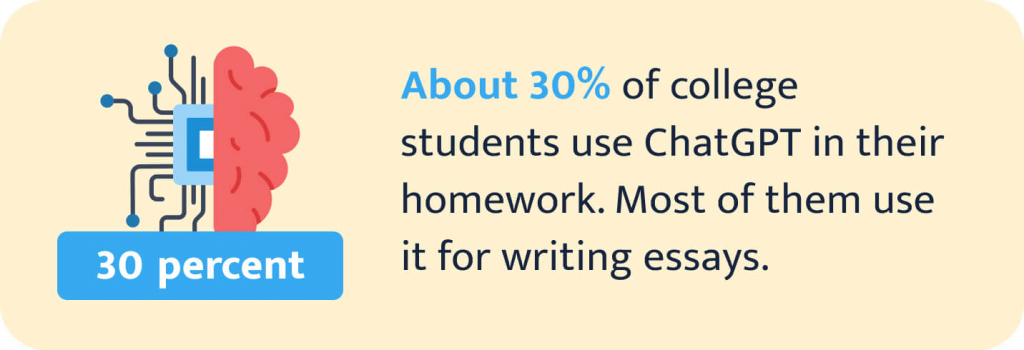
But what exactly sets ChatGPT’s summarization abilities apart from other similar tools? The answer lies in the method it uses. You see, there are two approaches to automatic text summarization: extractive (used by simple summarizers) and abstractive (used by advanced AI).
Here’s how they differ:
- Extractive summarization involves extracting and combining existing sentences from a text to create a summary. The result may lack essential information.
- Abstractive summarization allows formulating new text while preserving the main ideas of the source material. The result maintains all the essential information.
Let’s see these methods in action. We used the following passage from a Nature article on global warming to test both types of summarizes:
Example:
One thing is clear: the longer we wait, the harder it becomes to achieve the Paris goals, and experts say we have waited much too long. Global leaders committed to preventing “dangerous anthropogenic interference with the climate system” when they signed the United Nations Framework Convention on Climate Change in 1992. Had they honored that commitment and pressed forwards with emissions reductions at that time, they would have had a century to halt greenhouse-gas emissions and still limit warming to 1.5 °C.
The picture looks different three decades later. On the basis of current emissions trends, the world will burn through enough carbon to cause around 1.5 °C of warming in a little over five years, according to the latest carbon budget estimates from Climate Change Tracker, a scientific consortium that tracks climate trends using IPCC methodologies. The world would need to reduce carbon emissions by 8% each year between now and 2034 to maintain a 50% chance of staying below 1.5 °C of warming.
Here is an extractive summary of this fragment:
Example:
Had they honored that commitment and pressed forwards with emissions reductions at that time, they would have had a century to halt greenhouse-gas emissions and still limit warming to 1.5 C. On the basis of current emissions trends, the world will burn through enough carbon to cause around 1.5 C of warming in a little over five years, according to the latest carbon budget estimates from Climate Change Tracker, a scientific consortium that tracks climate trends using IPCC methodologies. The world would need to reduce carbon emissions by 8% each year between now and 2034 to maintain a 50% chance of staying below 1.5 C of warming.
And here’s an abstractive summary generated by ChatGPT:
Example:
The longer the world delays action on climate change, the more challenging it becomes to meet the goals set in the Paris Agreement. Global leaders, who committed to preventing significant climate interference in 1992, would have had a century to address emissions reductions and limit warming to 1.5 °C if they had acted then. However, current emission trends indicate that the world is on track to surpass 1.5 °C warming in just over five years. To maintain a 50% chance of staying below this threshold, the world would need to reduce carbon emissions by 8% annually until 2034, according to Climate Change Tracker estimates.
Check out how well-written and unique the second summary is. Unlike extractive summarization, the abstractive technique produces coherent and fluent results. It became widely available mainly thanks to the emergence of ChatGPT.
To produce such a stunning result, simply enter the prompt:
You can also add the desired number of sentences in your prompt.
💡 Pro tip:
We recommend using a key points generator in addition to ChatGPT to create well-structured summaries in just a couple of clicks.
Rewriting Technical Terms with ChatGPT
In academic texts, you may encounter terms and sentences that are overly technical and complicated. That’s when ChatGPT comes into play. Did you know that it can effectively rewrite complex texts using simple language? It will take seconds, and the text will retain meaning.
💡 Pro tip:
To make the results as straightforward as possible, you can ask the chatbot to rewrite it for you like you’re a high school student.
Let’s see how it works using the following segment from a very complicated paper on cell fate determination from ResearchGate:
Closely spaced divergent promoter pairs may also act as binary switches and play a role in the programming of cell fate or the generation of diverse phenotypes within a given cell type. The ability of a bidirectional promoter to function as a probabilistic switch was demonstrated in the murine Ly49 gene cluster, a family of major histocompatibility complex class I receptors that are stochastically expressed by natural killer (NK) cells.7A119-bp core bidirectional promoter was able to generate divergent transcripts. However, only one direction was active at any given time, allowing it to act as a binary switch.
Providing Examples with ChatGPT
If you are studying something abstract or difficult to convey in words, you can always ask the chatbot to provide a real-life example or an analogy to help you comprehend it.
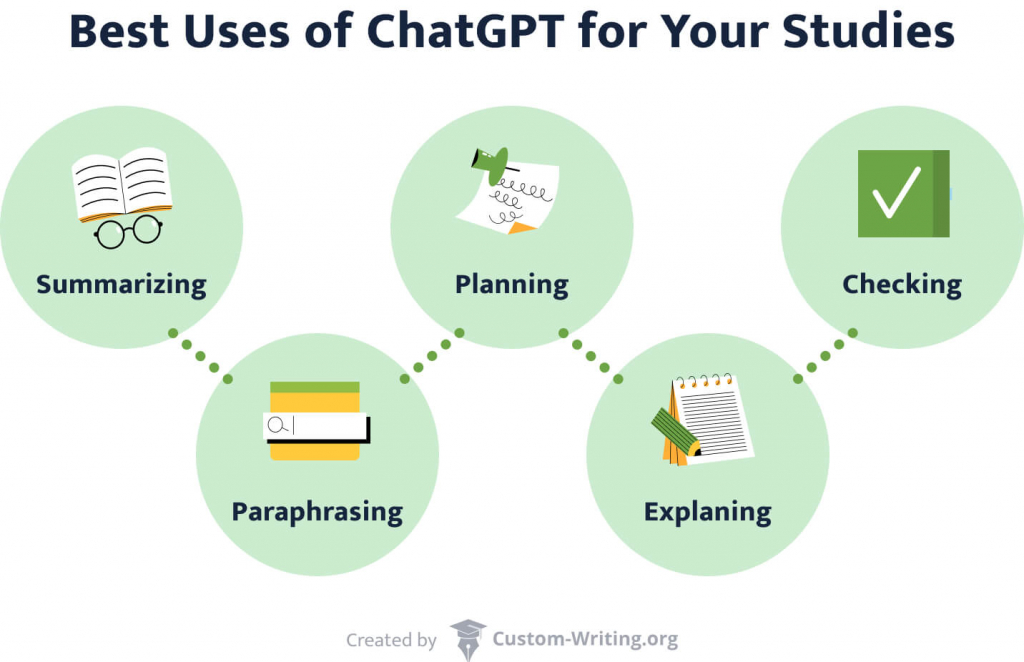
We decided to test this function with one of the most complicated concepts from Lacanian psychoanalysis:
As you can see, it works very nicely.
💡 Pro tip:
In case you need an explanation of a difficult quotation or a poem, feel free to use our intuitive quote explainer and poem checker.
Offering Step-by-Step Guidelines with ChatGPT
Students often encounter difficult scientific or mathematical problems. That won’t be an obstacle if you have ChatGPT at your disposal. Moreover, you can ask for a step-by-step explanation rather than a direct answer. Doing so will assist you in comprehending how exactly to tackle this problem.
Here’s how you can solve a math problem using this method:
A garden is in the shape of a rectangle with a length of 15 meters and a width of 8 meters. If each square meter of the garden requires 3 liters of water, how many liters of water are needed to completely water the entire garden?
Taking Notes with ChatGPT
Another great way to use ChatGPT is to ask it to create study notes for you. If, for instance, you didn’t have time to take notes yourself or can’t find the material to prepare for an upcoming quiz, you can ask the chatbot to gather information for you and even create an additional glossary of key terms.
Let’s see it in action. Here’s the prompt we entered:
It also included a glossary of terms, such as Lorentz transformation, frame of reference, and spacetime.
💡 Pro tip:
Need to create study notes right now? Check out Custom-Writing’s notes generator. This AI-powered tool is capable of producing results just as good as ChatGPT.
Planning Your Studies with ChatGPT
It’s always a good idea to make a plan that will help you prioritize your workload, especially if you have a lot of assignments or tests approaching. A great way to do this is to simply ask ChatGPT to create a timetable with time perfectly divided between various tasks.
To get the chatbot to create a timetable for you, write a prompt containing the following information:
- current date,
- days when you’re free every week,
- the number of hours you are free per day,
- the exact dates of your tests,
- each exam’s subject and topic,
- subjects that you need to focus extra on.
Here’s an example of such a timetable together with the prompt:
We really like this timetable because of the thoughtful time division between tasks. Tips at the end are also an excellent addition. Definitely try this option when you have your next exam week!
Checking Your Texts with ChatGPT
ChatGPT is very good at proofreading and editing thanks to its giant database of well-written texts. It can correct your mistakes and improve the text’s tone and flow. That aspect comes in handy when you need to check an essay before turning it in.
💡 Pro tip:
You could simply write “proofread the text” as a prompt, but that would only produce a corrected version. We recommend “proofread this text and point out any substantial mistakes” as a prompt. It’s also a good idea to ask ChatGPT to act as a teacher. This way, it will not only correct the text but also explain the reasoning behind its corrections.
For example:
People are oftentimes interested in beholding someone dance, especially if the dancer is skilled.
Preparing for Exams with ChatGPT
In addition to making timetables and writing study notes on your exam’s subject, ChatGPT can help you prepare by providing quiz questions. After you’re done answering them, you can go further and check yourself.
💡 Pro tip:
You can also go one step further and ask the AI to recommend books and links to better prepare for the exam.
Enter a prompt such as this:
This prompt yielded an extensive list of textbooks, online courses, video lectures, scientific journals, and even forums (“Participate in forums like Reddit’s biotechnology community or other academic forums to discuss concepts, ask questions, and learn from others”).
Providing Inspiration and Ideas with ChatGPT
An excellent method to overcome writer’s block and fear of a blank page is to use ChatGPT to generate unique ideas and topics. And what’s more, it works with almost any subject, even the most complicated ones.
For example, here’s what we tried:
As you can see, these are not just topics but extended essay prompts. You can also ask for prompts explicitly in your query. This is very convenient for helping you kickstart the writing process.
💡 Pro tip:
Want to get more inspiration on a topic you’ve already chosen? Try an essay format generator. It will provide you with writing ideas for each of your essay’s body paragraphs.
🤔 Drawbacks of ChatGPT Use for Studies
Despite being so helpful, ChatGPT still has significant drawbacks that can mess with your studies. We’ll discuss them now, but first, here’s a disclaimer:
Most of the following drawbacks are caused by the chatbot still being under development. Once it gets more advanced, many of them will likely disappear. As of December 2023, they’re still valid and worth considering.
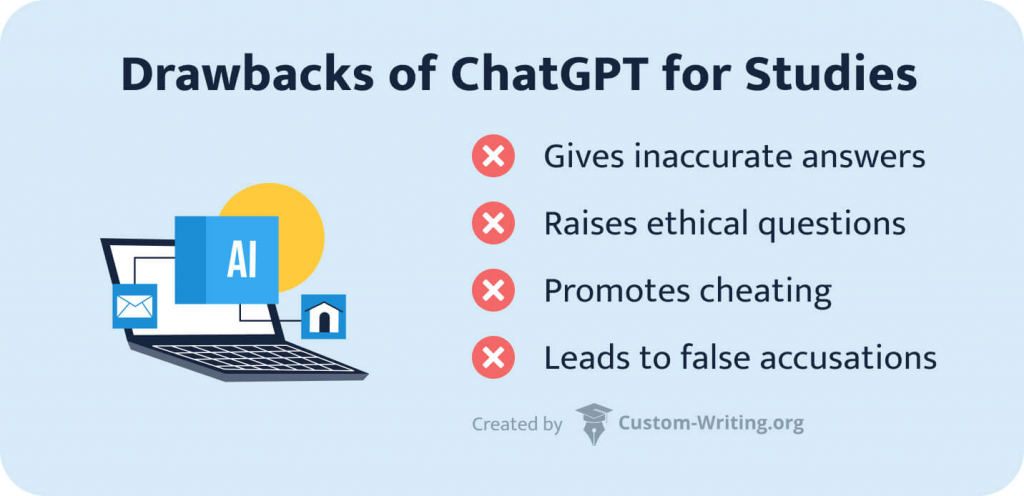
Drawback #1: It Can Give Inaccurate Answers
This is by far the biggest drawback. ChatGPT has yet to reach the level where it can become a reliable source of information. It’s because it doesn’t fully understand the meaning of the information in its database. ChatGPT focuses mainly on words and the connections between them rather than facts.
Here’s an example. We asked the chatbot to write an overview of the Zizekian concept of melancholia, which is complicated but not entirely obscure. This was our prompt:
Needless to say, we were impressed. We then tried to look up these quotes. As you can guess, Slavoj Žižek never said anything like this.
We then addressed ChatGPT directly on this issue:
The same thing will happen if you ask the chatbot to add statistics to your text or something else it can’t access. It will generate its own response and present it as if it were real. You can read more about such cases of misinformation in our article on ChatGPT and academic writing.
The biggest problem is that it’s hard to recognize that you’ve been misinformed. That’s why all the answers the chatbot provides must be thoroughly fact-checked. This is even noted in the disclaimer right under the dialog box:
ChatGPT can make mistakes. Consider checking important information. – OpenAI
Drawback #2: It Has Its Limitations
Although ChatGPT can do many things, it’s far from omnipotent. Its main limitations include the following:
- The prompts in the standard subscription can be pretty long (up to 4096 words), but the longer your prompt is, the less relevant the replies become.
- It can ignore your restrictions. For example, even if you write “make the reply 200 words long,” the response could range from 100 to 300 words.
- Even though ChatGPT is capable of writing longer texts, it can simply decline to do so (“I’m sorry, but I can’t generate a 1000-word text for you. However, I can provide you with an outline and key points that you can use as a basis to create your own text.”)
- Occasionally, ChatGPT will quit before finishing generating its reply. To fix this, you have to press “continue,” though it may still fail to continue generating afterward.
- It’s ignorant of many obscure subjects. Currently, only the premium version has access to the Internet, while the free one has to do with whatever ChatGPT’s database contains.
- The chatbot can’t comprehend subtle emotions and tone variations, such as irony and sarcasm.
- Its database limits itself by September 2021. ChatGPT is unaware of current events, and the gap becomes wider each day.
Drawback #3: It Raises Ethical Questions
Another unfortunate tendency AI technology has demonstrated is ethical issues in its responses. Due to its inability to understand human ethics and the biases contained in its database, ChatGPT may unintentionally respond in ways that are homophobic, sexist, or racist. It’s also unable to determine what is reasonable, accurate, or fair when evaluating prompts.
Another nasty thing is that the chatbot can cause leaks of private data. AI trainers can see the chats, and the information you publish online can be used to further train AI. This raises serious concerns about intellectual property.
Drawback #4: It Can Plagiarize
It may come as a surprise, but texts generated by ChatGPT can contain pretty big chunks of plagiarism. This happens because the chatbot builds its database from online sources and combines phrases from them in its replies.
Whether or not all of ChatGPT’s texts are technically plagiarized is still debatable. Some believe that its writings can’t be considered plagiarism because the chatbot only rearranges pre-existing texts rather than copying them on purpose. Others claim that everything it writes is plagiarized because it paraphrases and duplicates the writings of other authors without giving them credit. Even if such plagiarism is not intentional, it still raises many questions.
Drawback #5: It Promotes Academic Cheating
ChatGPT is an excellent tool for enhancing your studies. Still, many students use it for cheating. Some generate entire essays without even trying themselves, while others use the chatbot to solve tests.
According to Forbes, 50% of students who used ChatGPT say they only used it to complete a small portion of the work. Still, 30% generated the bulk of their assignment, and 17% turned chatbot’s texts in without edits. This statistical data is alarming, and we strongly discourage you from using the power of AI for cheating.
Submitting AI-generated texts as your own work is punishable. It may even lead to expulsion and limit your educational and career opportunities. Always keep it in mind when using ChatGPT to enhance your studies.
Drawback #6: It Can Lead to False Accusations
When it comes to ChatGPT disadvantages for your studies, this one is among the worst. According to Educause’s survey, 29% of teachers think that students pass AI-generated texts after editing, and 23% think students pass these texts as is.
Judging by Forbes’ survey cited above, not so many students submit generated texts with no edits. And while teachers’ concerns are understandable, they are also disappointing because students who complete their assignments without AI can get falsely accused.
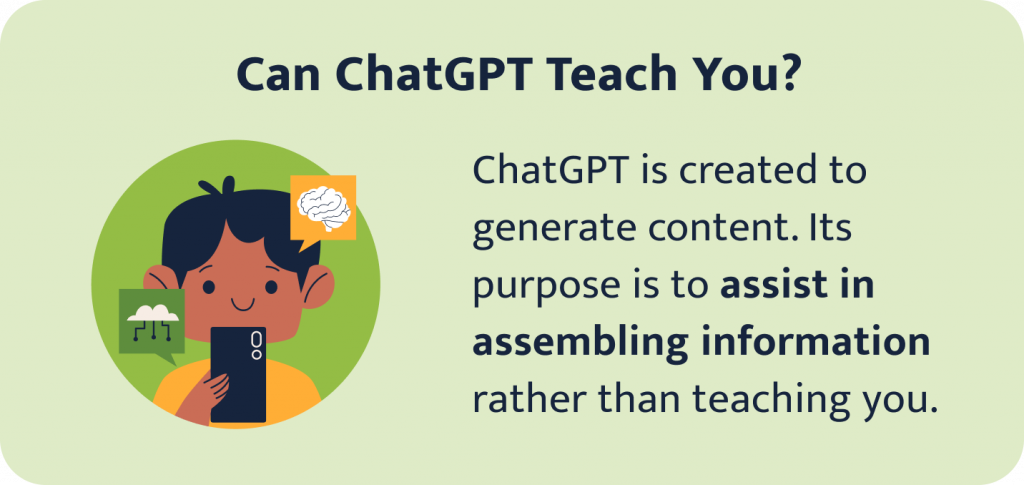
Schools and colleges are aware of issues with ChatGPT. One of the methods teachers use to find generated text is through AI detectors. These detectors analyze students’ work for typical features of ChatGPT’s replies, including word predictability. An average checker can determine when text is created by an AI with almost 90% accuracy.
Still, a 10% chance of failure causes another problem. Sometimes, you can simply write a text with predictable words without any help from the chatbot, and it will be marked as AI-generated. This leads to students being falsely accused of cheating, which is highly stressful and dangerous.
Here’s an example. Remember the snippet from a Nature article we attempted to summarize at the beginning of this article? An AI detector stated that it has a “relatively high risk” of being written by ChatGPT. That’s pretty shocking, considering a human wrote it, and it doesn’t appear to be all that predictable.
🚀 Balancing the Pros and Cons of ChatGPT in Your Studies
As you can see, Chat GPT advantages and disadvantages balance each other out. So, is AI good or bad for your studies? Well, the short answer is it’s good if you use it with a balanced approach, and it’s bad if you rely too much on it.
To help you avoid possible adverse effects and get the most out of your educational experience with ChatGPT and its alternatives, make sure to follow these tips:
- Don’t expect the chatbot to provide 100% correct statistics, facts, and quotes. Instead, find them yourself and ask it to incorporate them into its answers.
- Always rely on your critical thinking and fact-check every answer the chatbot gives you.
- Avoid using ChatGPT to generate everything for you. Instead, use its functions to enhance your own essays.
- If possible, check all texts you write for school with an AI essay checker to avoid false accusations.
- Avoid entering any private information into the chatbot. If you do, it’s better to delete the chat right afterward.
- Never cite ChatGPT as a source of facts in references. Educators don’t consider it trustworthy.
- If you really need to include AI-generated content in your text, use proper citing.
- Use ChatGPT as a study helper, not as a full-fledged replacement for the educational process.
🎓 Limitations and Advantages of ChatGPT: Key Takeaways
Now you know that a balanced approach is key to using AI ethically and efficiently in your studies. Let’s go over the main ChatGPT pros and cons once again to remember them better:
👍 Advantages
- Saves time,
- Enhances your education,
- Easy to master,
- Accessible to everyone,
- Customizable,
- Provides ideas and inspiration,
- Great for exam preparation.
👎 Disadvantages
- Raises plagiarism concerns,
- Unable to understand ethics and emotions,
- Leads to false accusations,
- Associated with privacy risks,
- Must be thoroughly fact-checked,
- Can be biased.
We hope that this article was helpful and that you’ll use the knowledge gained here to get the most out of ChatGPT. Give it a go, and have fun!
Check out other excellent materials about ChatGPT and similar AI tools:
- ChatGPT Essay Examples
- 17 Best AI Tools for Students in 2026
- 14 Best AI Detectors for Students in 2026
- How Do AI Detectors Work?
- 17 Best AI Tools for Homework in 2026
🔗 References
- Chat GPT: What Is It?: University of Central Arkansas
- What Is ChatGPT? Everything You Need to Know: TechTarget
- The Brilliance and Weirdness of ChatGPT: The New York Times
- How to Use ChatGPT as a Learning Tool: American Psychological Association
- As ChatGPT Enters the Classroom, Teachers Weigh Pros and Cons: National Education Association
- Using ChatGPT to Summarize Text: Microsoft
- Four Ways to Use ChatGPT as a Medical Student: Top Universities
- Should You Use ChatGPT for Your Studies?: UQ Library
- ChatGPT Is Going to Change Education, Not Destroy It: MIT Technology Review
- ChatGPT: Opportunities and Challenges for Education: University of Cambridge
- How ChatGPT Can Help Students Learn, Prevent Cheating: VOA
- Guidelines for the Ethical Use of Generative AI (i.e. ChatGPT) on Campus: Santa Clara University
- ChatGPT: Old AI Problems in a New Guise, New Problems in Disguise: Monash University
- ChatGPT Cheating: What to Do When It Happens: Education Week
- ChatGPT Making It Easier for Students to Cheat in School: CBS News
- ChatGPT: New AI System, Old Bias?: Mashable
- Using ChatGPT-4 to Prepare for Exams: Substack
- How You Can Use ChatGPT for Studying: The Daily Star
- Four of the Best Ways to Study (but Not Cheat) With ChatGPT: Lifehacker
- The Ethics of ChatGPT — Exploring the Ethical Issues of an Emerging Technology: ScienceDirect
- Student Guide to ChatGPT: The University of Arizona
- ChatGPT and the Decline of Critical Thinking: IE


